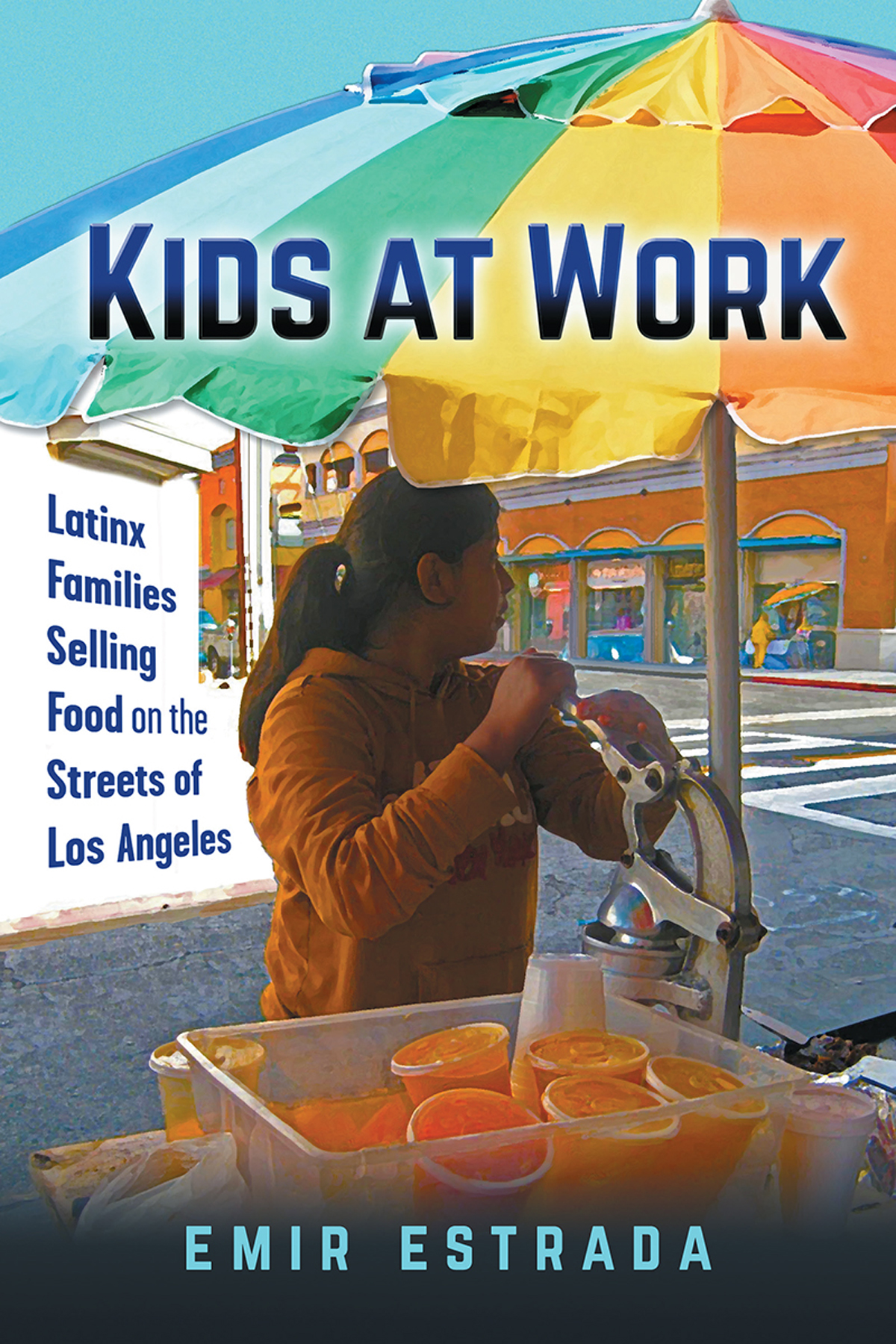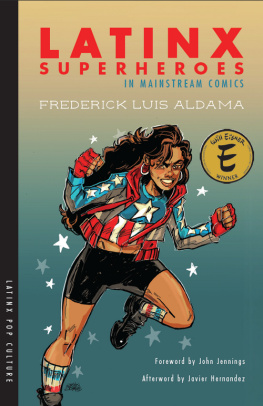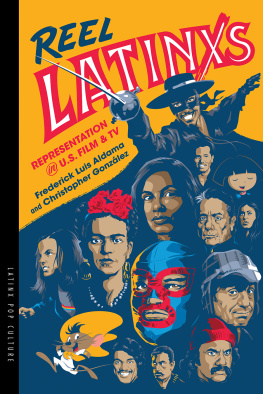Contents
Guide
Pagebreaks of the print version

KIDS AT WORK
LATINA/O SOCIOLOGY SERIES
General Editors: Pierrette Hondagneu-Sotelo and Victor M. Rios
Family Secrets: Stories of Incest and Sexual Violence in Mexico
Gloria Gonzlez-Lpez
Deported: Immigrant Policing, Disposable Labor, and Global Capitalism
Tanya Maria Golash-Boza
From Deportation to Prison: The Politics of Immigration Enforcement in PostCivil Rights America
Patrisia Macas-Rojas
Latina Teachers: Creating Careers and Guarding Culture
Glenda M. Flores
Citizens but Not Americans: Race and Belonging among Latino Millennials
Nilda Flores-Gonzlez
Immigrants under Threat: Risk and Resistance in Deportation Nation
Greg Prieto
Kids at Work: Latinx Families Selling Food on the Streets of Los Angeles
Emir Estrada
Kids at Work
Latinx Families Selling Food on the Streets of Los Angeles
Emir Estrada

NEW YORK UNIVERSITY PRESS
New York
NEW YORK UNIVERSITY PRESS
New York
www.nyupress.org
2019 by New York University
All rights reserved
References to Internet websites (URLs) were accurate at the time of writing. Neither the author nor New York University Press is responsible for URLs that may have expired or changed since the manuscript was prepared.
A previous version of chapter 5 was published as Emir Estrada and Pierrette Hondagneu-Sotelo, Living the Third Shift: Latina Adolescent Street Vendors in Los Angeles, in Immigrant Women Workers in the Neoliberal Age , edited by Nilda Flores-Gonzlez, Anna Romina Guevarra, Maura Toro-Morn, and Grace Chang (Urbana: University of Illinois Press, 2013), 14463.
Library of Congress Cataloging-in-Publication Data
Names: Estrada, Emir, author.
Title: Kids at work : Latinx families selling food on the streets of Los Angeles / Emir Estrada.
Description: New York : New York University Press, [2019] | Series: Latina/o sociology series | Includes bibliographical references and index.
Identifiers: LCCN 2018037664 | ISBN 9781479811519 (cl : alk. paper) | ISBN 9781479873708 (pb : alk. paper)
Subjects: LCSH: Street-food vendorsCaliforniaLos AngelesCase studies. | Child laborCaliforniaLos AngelesCase studies. | Latin AmericansCaliforniaLos AngelesSocial conditions. | Hispanic American familiesCaliforniaLos AngelesSocial conditions. | Immigrant familiesCaliforniaLos Angeles. | Children of illegal aliensCaliforniaLos Angeles.
Classification: LCC HF 5459. U 6 E 88 2019 | DDC 331.3/18dc23
LC record available at https://lccn.loc.gov/2018037664
New York University Press books are printed on acid-free paper, and their binding materials are chosen for strength and durability. We strive to use environmentally responsible suppliers and materials to the greatest extent possible in publishing our books.
Manufactured in the United States of America
10 9 8 7 6 5 4 3 2 1
Also available as an ebook
To the two most important mujeres in my life:
Para la Maestra Leonor Estrada Rivas
Por ser una madre, maestra, y mujer ejemplar
Para mi hija Xitlali
Porque es bello ser tu mam
CONTENTS
Introduction
Working with la Familia
Marthas alarm rings at six oclock every morning. During the week, she wakes up early in order to make it to her private Catholic high school on time, but every Saturday and Sunday, she wakes up at dawn to sell corn on the cob, cut-up fruit, churros, and shaved ice, commonly known in Spanish as raspados . Martha, now eighteen years old, began street vending with her undocumented parents when she was seven. At first, she and her younger sister Sofia sold food outside their local church with their mother. Later, when Martha turned thirteen, she and her sister started street vending by themselves. I met Martha during the summer of 2008 while she was street vending at a park. By then she had been street vending for eleven years, five of which were on her own. I bought and ate a diced mango on a stick that Martha cutwith great agilityin a way that resembled a flower in bloom dressed with lemon juice and sprinkled with powdered chili and salt. As I nibbled on the mango, I told Martha about my study and she agreed to an interview for the following Friday after school. The interview took place in the backyard of her parents house. After the interview, she challenged me to street vend with her so that I could get a real sense of her life, and so I did.
The first time I went street vending with Martha, the weather forecast had promised a typical sunny summer day in Southern California. I arrived at her house at six oclock in the morning. Marthas mother, Lourdes, greeted me at the door, and the warmth from a large pot of freshly steamed corn permeated the house with an earthy aroma. Lourdes told me that Martha and Sofia had helped strip off the leaves from the ear of corn the night before. They had also placed the corn inside the large pot, ready for Lourdes as she turned on the stove early the next morning before the day of street vending. While Lourdes continued explaining their evening routine, she offered me a cup of coffee. I enjoyed the coffee and Lourdess story while we waited for her daughters to wake up and get dressed. When Martha exited her bedroom, I was sitting on a tall stool near the stove drinking my coffee. She glanced at me with her intimidating side look and said with a smirk, Is that what you are wearing? Holding my mug with my two hands, I discreetly scanned myself, noticing my sandals, blue jeans, and a spaghetti strap turquoise blouse. Youre gonna get burned, girl, she exclaimed. She was rightthat day I got the worst sunburn of my life, and I actually think Martha enjoyed telling me I told you so at the end of the day. In contrast, Martha dressed appropriately with a flannel shirt, blue jeans, tennis shoes, and a Dodger hat that protected her from the sun and kept her long wavy black hair in a ponytail off her face and away from the food she will sell. Her younger sister Sofia wore something similar.
For the next hour, I saw the entire family prepare for their long day of street vending work. Both Martha and Sofia took turns carrying crates full of mangos, boxes of canned soda, small bags of peanuts that they bagged the night before, and several plastic milk containers now full of colorful concentrated syrups for the raspados. Meanwhile, Marthas father, Javier, hooked a small trailer onto the truck containing three street vending carts: one for him, another for Martha, and the last one for Sofia. This has been a typical weekend morning routine for Martha and Sofia since they were little girls.
Linger around the streets of Los Angeles and Boyle Heights and you will notice, as I did, that many children like Martha and Sofia are vending with their immigrant parents. These children are full-time students, but they are also economic co-contributors in the household. They relax, play, and socialize when business is slow, but for the most part, they are busy charging customers, taking food orders, heating up tortillas, running errands to the store, and translating for parents. I also saw them do work at home at different times of the day and night, as they cut, bag, sort, and cook the food they will later sell. For example, fourteen-year-old Leticia is in charge of making seven types of sauces, sixteen-year-old Sofia bags peanuts and the churros she makes at home, and twelve-year-old Salvador cooks goat meat in his backyard while his mother and sister Norma make the sauces and dice onions in the kitchen.











